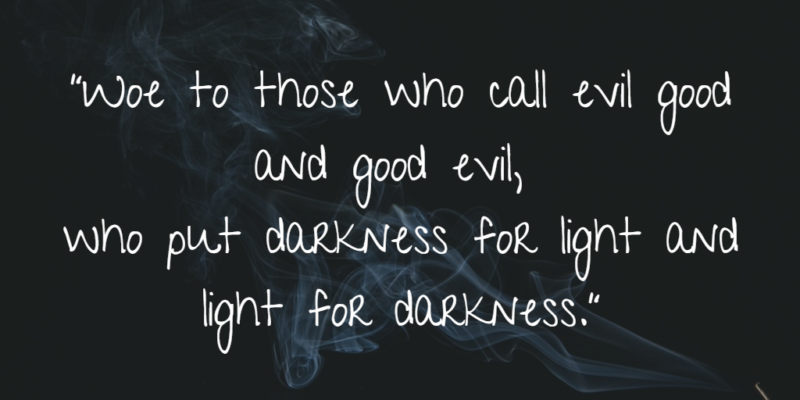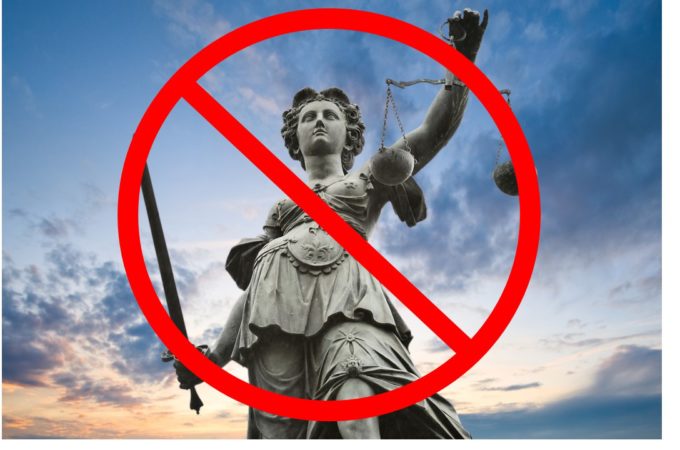Healthy, flourishing societies are built on a foundation of truth. Not just truth in the ultimate sense, but truth in the everyday sense. There are facts in our daily existence which objectively exist, regardless of whether or not people believe them. As the common expression goes, “you are entitled to your own opinions, but not your own facts.”
So what happens to a society when it believes that people are entitled to their own facts—their own truth—regardless of whether it aligns with reality?
When people abandon a transcendent basis for objective truth, they also abandon a transcendent basis for morality—they become little deities who define right and wrong, good and evil. One of the most damaging aspects of narratives is their tendency to invert good and evil, justice and injustice. Narratives are morality tales, with heroes, villains, victims and oppressors. Those that create or perpetuate narratives write themselves into these stories as heroes or victims. The heroes and victims are always on the side of justice and righteousness. The villains and oppressors are always on the side of injustice and oppression—even when reality may be closer to the inverse.
Take, for example, the LGBT movement. This movement is fueled by a powerful narrative that LGBT activists have skillfully crafted and carefully perpetuated with tremendous success in accomplishing their cultural objectives. Lesbians, gays, and the transgendered are the “good guys,” fighting for basic human rights and equality. The name of one of their most powerful advocacy organizations, “The Human Rights Campaign,” says it all. Christians, who hold to biblical teaching on human nature and sexuality, are the villains. They are hateful bigots who favor inequality, discrimination, and oppression. For justice to prevail, the evil oppressors must be held to account. They must be punished, marginalized and ultimately silenced.
 Does this narrative portray a picture of right and wrong, good and bad that aligns with objective, transcendent morality? Are LGBT activists on the side of the good, true and beautiful? Are Christians hateful bigots who pose a danger to society? As the prophet Isaiah warned, “Woe to those who call evil good and good evil, who put darkness for light and light for darkness.”
Does this narrative portray a picture of right and wrong, good and bad that aligns with objective, transcendent morality? Are LGBT activists on the side of the good, true and beautiful? Are Christians hateful bigots who pose a danger to society? As the prophet Isaiah warned, “Woe to those who call evil good and good evil, who put darkness for light and light for darkness.”
Those that create such narratives genuinely believe they are true (again, by the standard that truth is individually determined), even if they are highly distorted pictures of reality. They become ideologues, highly defensive and resistant to any facts or evidence that challenge their preferred narratives.
What happens to a society when its people inhabit a “reality” of their own creation—when their very sense of identity is based in an illusion?
Before postmodernism became culturally dominant, male and female were understood to be distinct sexes. This was conventional wisdom—common sense. It was simply a biological fact. It never occurred to people that being male or female could be a matter of personal choice. But all that has changed. Kant’s innovative notion that the mind creates reality and imposes structure and order on the world has gone mainstream. Now, if you are born a biological male but believe you are a female, then you are a female (or a dragon, or Chinese, or whatever else you choose to believe).
When a man believes that he is actually a dragon, the word that describes this is “delusional.” It is tragic when people succumb to delusion. Consider the impact of this man’s transitioning into a “dragon” on his wife and young child, not to mention his extended family and his co-workers? Now think of the damage done when society believes it is required to affirm that someone is a dragon because it is “true” for him, and he is entitled to his own facts.
British philosopher Daniel Moody reports that today “the emerging gold standard of gender re-assignment laws is that countries should implement a regime of self-declaration: When John says he is female, his saying so is also the very thing that makes him so” (italics added). Note how even the practice of law and politics are now shaped by this postmodern belief in the sovereignty of the individual as the definer of reality. Can law and politics be sustained in such a cultural climate? Can a society function when every person in that society feels empowered to define reality for themselves?
What effect will narratives have?
Think for a moment of those fields of knowledge, those institutions, and those essential government services that are built on real, hard external facts and reality outside of the mind. What happens, for example, to the scientific enterprise when people no longer choose to follow the evidence wherever it leads, but ignore or suppress the best available scientific data if they conflict with their preferred narrative? The scientific enterprise collapses.
What happens to the university when it is no longer a place to search out and discover the truth, but devolves into an ideological bubble where only the narratives of those in power are allowed to be expressed and dissenting views are no longer tolerated? The university collapses.
What happens to the journalistic enterprise when journalists no longer regard their primary duty to pursue truth by doggedly seeking out all sides of a story, weighing evidence, and not allowing their personal biases to cloud their reporting as much as possible? How could they see their role that way in a society where no objective truth exists? What happens when they believe that all that exists are different perspectives, various narratives, but no ultimate truth? What happens when journalism simply becomes a means of advocating whatever narrative journalists happen to support? The journalistic enterprise collapses. It devolves into mere propaganda.
What happens to the criminal justice system when prosecutors no longer care about the real, objective facts and evidence of a particular case but choose to impose their preferred narrative? What happens to due process and trial by jury, if jurists feel empowered to ignore carefully gathered evidence in favor of their own preferred narrative? The entire justice system is undermined. Innocent people go to prison while the guilty are left unpunished.
What happens to social unity and cohesion when there is no one accepted view of reality, but instead a diversity of competing, often irreconcilable narratives? What happens when the quest for truth becomes a quest for power in order to impose my preferred narratives on others? According to Nancy Pearcey, “If there is no objective or universal truth, then any claim to have objective truth will be treated as nothing but an attempt by one interpretive community to impose its own limited, subjective perspective on everyone else. An act of oppression. A power grab.” Social unity breaks down, and chaos ensues.
Postmodernism has given rise to a culture of narrative creation and promotion that erodes all of these social goods and many more. When a society gives up belief in objective reality, a great deal of what goes into fostering a healthy, flourishing society is weakened and will eventually disappear. Without a commonly shared understanding of a real, external reality to give a sense of unity to a society, all that remains is diversity. Diversity without unity will ultimately lead to chaos, and chaos cannot be sustained. It will inevitably lead to the dissolution of society and culture, or more likely, the imposition of order by the powerful, or totalitarianism.
Narratives, and the postmodern worldview that underpins and sustains them, are a destructive force, a corrosive acid that eats away the very pillars of a healthy, flourishing society.
- Scott Allen






